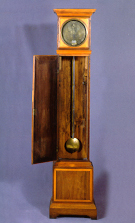
171.2 x 23 x 39.6
Inlaid wood, steel, brass and iron
(under inventory)
The pendulum clock shown here has the signature of John Hyacinth Magellan on the clock face. This Portuguese physicist, born in Aveiro, lived in London during his most productive phase, where he also died.
Magellan was a member or correspondent of the following scientific societies: Academia das Ciências de Lisboa, Académie Royal de Sciences de Bruxelles, Académie des Sciences de Paris, Imperial Academy of Sciences of St. Petersburg, Akademie der Wissenschaften of Berlin, The American Philosophical Society of Philadelphia, Hollandsche Maatschappij der Wetenschappen of Haarlem, Real Academia de las Ciencias of Madrid, The Literary and Philosophical Society of Manchester and The Royal Society of London.
In London, Magellan collaborated with the Spanish and Portuguese crowns, sending them collections of instruments related to astronomy, physics, navigation etc., having supervised their construction in the English capital. Some pendulum clocks formed part of this collection, the Physics Museum having the privilege of seeing one of them integrated in its collection.
The face of the clock in the Physics Museum has two hands, one bigger than the other. The bigger hand turns around the central axis of the face, indicating the minutes on a scale divided into sixty equal parts and marked every five minutes. The smaller hand moves on a second scale of smaller dimensions located on the upper part of the face. This scale is also divided into sixty parts and indicates the seconds, every ten being marked. There is a little window in the lower part of the face, through which it is possible to observe another scale in Roman numerals. This scale is engraved on a disk situated to the rear of the main clock face and shows the hours.
The clocks designed by J.H. de Magellan are described in the Notice des Instruments d' Astronomie de Geodesie et de Physique, etc., Fait à Londres pour la Cour d'Espagne, etc.Magellan, John Hyacinth, Collection de Différents Traités sur des Instrumens d'Astronomie, Physique, etc., London, 1780, pp. 192 - 257.